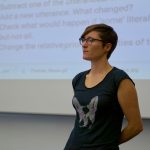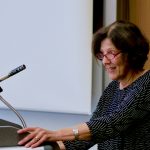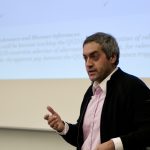The University of Cologne hosted the annual XPrag.de meeting on September 18th and 19th followed by a three-day methods workshop in Experimental Pragmatics. This year’s meeting was special because it was the final meeting of the first phase our program and at the same time the kick-off for the second phase. Project groups of the first phase have presented their remarkable results while the projects of the second phase have introduced their plans for the next three years resulting in a total of 12 talks and 15 posters. The meeting was opened with an exciting talk by first phase’s mercator fellow Jesse Snedeker (Harvard University) titled “Where does recursion come from? Evidence from an emerging sign language“. A second invited talk was given by Kai Vogeley on “Neural Mechanisms of Intersubjectivity“. On Tuesday afternoon, the Programme Director Humanities and Social Sciences 2: Social and Behavioural Sciences of the German Research Foundation (DFG) Helga Weyerts-Schweda gave an overview of the funding opportunities offered by the DFG. Overall, these were two busy days with exciting presentations and many fruitful discussions leading to first plans for collaboration between various XPrag.de projects.
The second half of the week featured a methods workshop on new developments in experimental methods and their links to pragmatic theory. More specifically, XPrag.de member Judith Degen (Stanford University) gave an introductory course on “Probabilistic pragmatics and the Rational Speech Act framework”. XPrag.de Mercator Fellow Lyn Frazier (U Mass Amherst) gave a series of lectures on language processing, in particular the processing of non-at-issue content and the pragmatics of ellipsis among others. The third course held by XPrag.de Mercator Fellow Napoleon Katsos (University of Cambridge) addressed the acquisition of pragmatic competence. The workshop slides can be found here. A further event was an interactive workshop on gender and diversity in academia to prepare researches for related challenges in their role as principal investigator or professor held by Monika Schoop (U Cologne). The methods workshop was a great success attracting more than 50 attendees from all across Europe.



